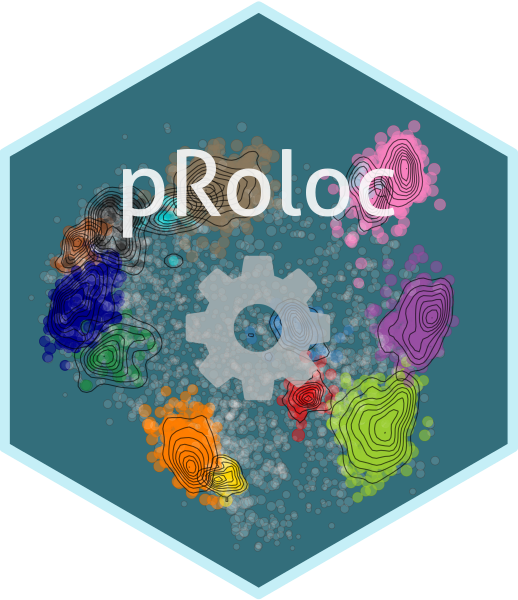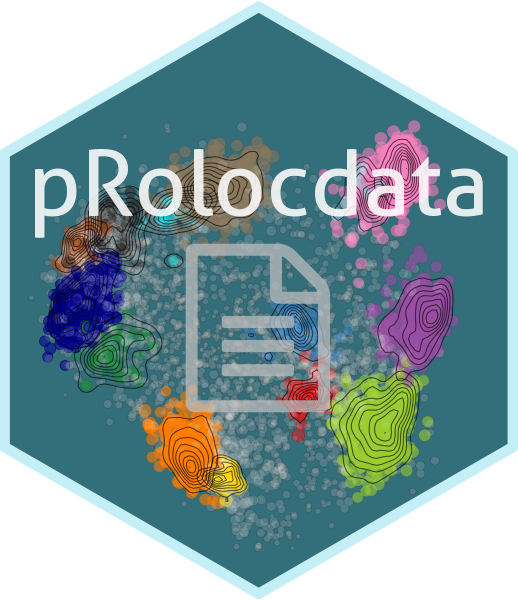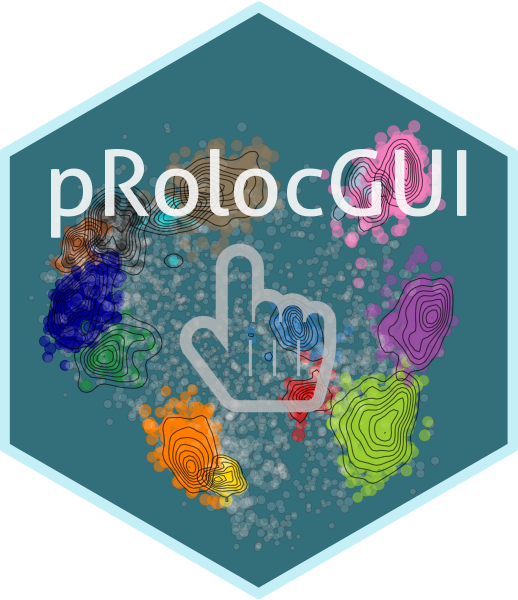The pRoloc suite set of software offers a complete software pipeline
to analyse, visualise and interpret mass spectrometry-based spatial
proteomics data such, for example, as LOPIT (Localization of Organelle
Proteins by Isotope Tagging), PCP (Protein Correlation Profiling) or
hyperLOPIT (hyperplexed LOPIT). The suite includes
pRoloc,
the mail software that focuses on data analysis using state-of-the-art
machine learning,
pRolocdata,
that distributes numerous datasets, and pRolocGUI, that offers
interactive visualisations dedicated to spatial proteomics. The
software are distributed as part of the
R/Bioconductor project.
The pRoloc software comes with ample
documentation. The
main tutorial provides
a broad overview of the package and its functionality. See the
Articles tab for additional manuals.
pRolocGUI
also offer several documentation files.
Here are a set of
video tutorial
that illustrate the pRoloc framework.
Post your questions on the
Bioconductor support site,
tagging it with the package name pRoloc (the maintainer will
automatically be notified by email). If you identify a bug or have a
feature request, please open an
issue on the github
development page.
The preferred installation procedure uses the Bioconductor infrastructure:
## unless BiocManager is already installed
install.packages("BiocManager")
## then
BiocManager::install("pRoloc")
BiocManager::install("pRolocdata")
BiocManager::install("pRolocGUI")The pre-release/development code on github can also be installed using
BiocManager::install, as shown below. Note that this requires a
working R build environment (i.e Rtools on Windows - see
here). New
pre-release features might not be documented not thoroughly tested and
could substantially change prior to release. Use at your own risks.
## unless BiocManager is already installed
install.packages("BiocManager")
## then, install from github
BiocManager::install("lgatto/pRoloc")
BiocManager::install("lgatto/pRolocdata")
BiocManager::install("ComputationalProteomicsUnit/pRolocGUI")For refences about the software, how to use it and spatial proteomics data analysis:
-
Breckels LM, Mulvey CM, Lilley KS and Gatto L. A Bioconductor workflow for processing and analysing spatial proteomics data F1000Research 2016, 5:2926 doi:10.12688/f1000research.10411.1.
-
Gatto L, Breckels LM, Burger T, Nightingale DJ, Groen AJ, Campbell C, Nikolovski N, Mulvey CM, Christoforou A, Ferro M, Lilley KS. A foundation for reliable spatial proteomics data analysis Mol Cell Proteomics. 2014 Aug;13(8):1937-52. doi: 10.1074/mcp.M113.036350. Epub 2014 May 20. PubMed PMID: 24846987
-
Gatto L, Breckels LM, Wieczorek S, Burger T, Lilley KS. Mass-spectrometry-based spatial proteomics data analysis using pRoloc and pRolocdata Bioinformatics. 2014 May 1;30(9):1322-4. doi: 10.1093/bioinformatics/btu013. Epub 2014 Jan 11. PubMed PMID: 24413670.
Specific algorithms available in the software:
-
Breckels LM, Gatto L, Christoforou A, Groen AJ, Lilley KS, Trotter MW. The effect of organelle discovery upon sub-cellular protein localisation J Proteomics. 2013 Aug 2;88:129-40. doi: 10.1016/j.jprot.2013.02.019. Epub 2013 Mar 21. PubMed PMID: 23523639.
-
Breckels LM, Holden S, Wojnar D, Mulvey CMM, Christoforou A, Groen AJ, Kohlbacher O, Lilley KS and Gatto L. Learning from heterogeneous data sources: an application in spatial proteomics 2015 biorXiv, doi: http://dx.doi.org/10.1101/022152
-
Oliver M Crook, Claire M Mulvey, Paul D. W. Kirk, Kathryn S Lilley, Laurent Gatto A Bayesian Mixture Modelling Approach For Spatial Proteomics bioRxiv 282269; doi: https://doi.org/10.1101/282269
Contributions to the package are more than welcome. If you want to contribute to this package, you should follow the same conventions as the rest of the functions whenever it makes sense to do so. Feel free to get in touch (preferable opening a github issue) to discuss any suggestions.
Please note that this project is released with a Contributor Code of Conduct. By participating in this project you agree to abide by its terms.


